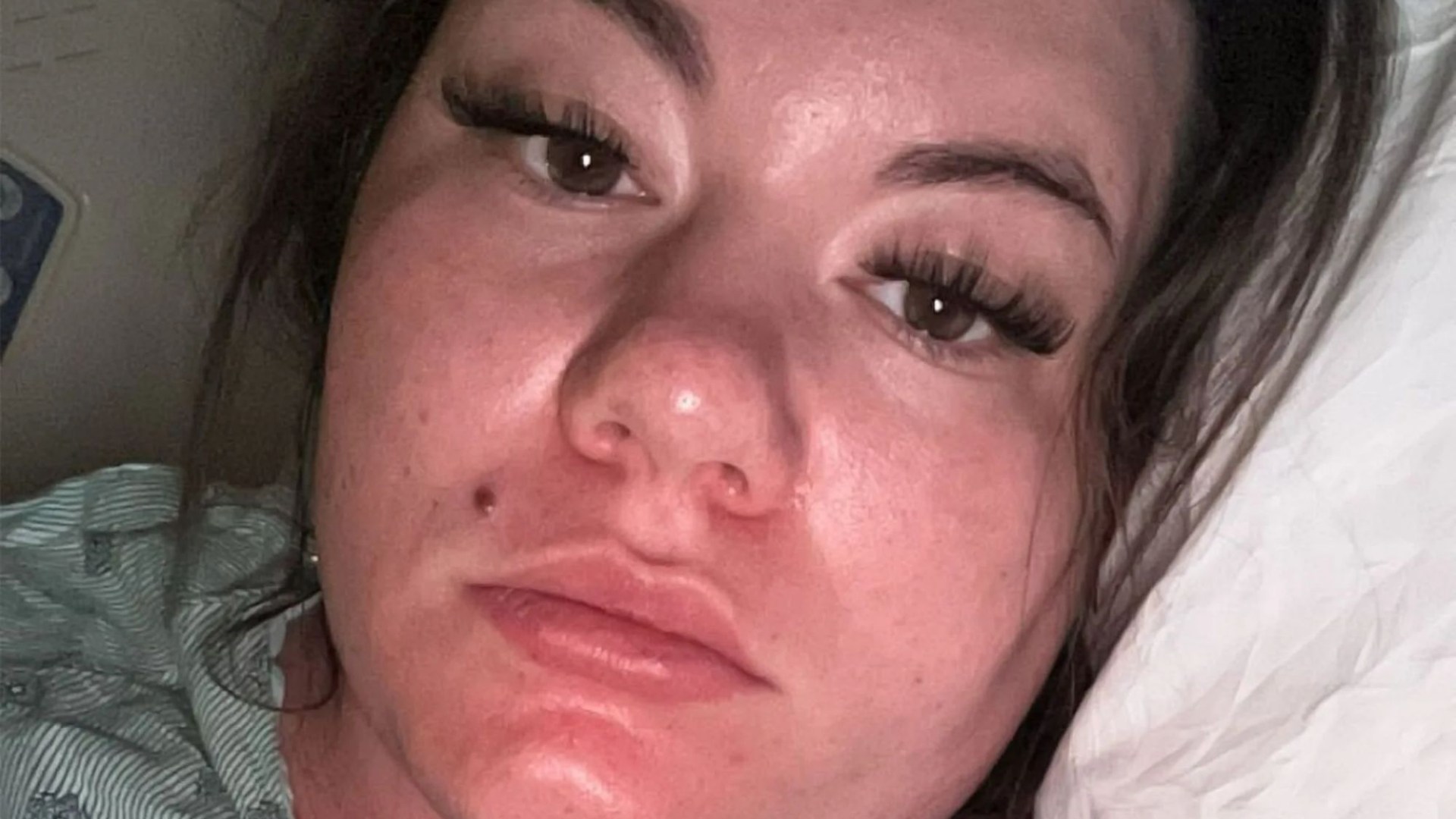A MUM was left horrified after her birth control coil that was lost inside her for 12 years finally turned up… in her rectum.
Daniella Hampton had an intrauterine device (IUD) – also known as the copper coil – placed into her womb in 2009, but was told six weeks later it had fallen out.
9

9

9
Doctors told the health insurance worker they couldn’t feel the strings attached to it and an ultrasound showed nothing.
But the 29-year-old “never stopped believing” the coil remained in her body and felt “dismissed” by doctors who never took her claims of pains in her bum seriously.
The mum-of-two believed she was “going crazy”, unable to understand why she couldn’t conceive despite actively trying for nine years.
All this time, she unknowingly had the birth control inside her.
Read more on contraception
It was only when Daniella was in a car accident in April 2021 that an X-ray revealed the IUD was inside her colon, having perforated her uterus.
Surgery to remove the coil brought “relief” to Daniella and three years later she finally gave birth to her second son, Champion Hampton, in April 2024.
Taking to Facebook, the 29-year-old shared photos of her X-rays captioned “trust your body ladies. I always knew it was inside of me but couldn’t prove it”.
‘NOT HEARD’
Daniella, who lives in New Orleans, Louisiana, US, said: “It was like playing hide and seek with the IUD for 12 years. It was pretty traumatic.
“For two years I had an implant in my arm at the same time. I felt my hormones were going crazy. I was having mood swings.
“Now I know I had two forms of birth control that definitely went hand in hand [until I had the implant removed after two years].”
Despite doctors insistence that her IUD had fallen out, Daniella said she remained convinced the device was still somewhere in her body.
“I never stopped believing that it was still in there. I had mentioned it to other providers but once I told them I had the ultrasound they thought nothing of it.”
Her claims that she was suffering pain in her bottom were also largely ignored.
“In the years following, I had sharp pains in my rectum area. I always felt like it was there but I was told it wasn’t,” the mum recalled.
“I definitely felt dismissed and not heard. It was discouraging. I just went along with it.
“I was going crazy because I was like ‘what’s going on with my body’. I couldn’t understand. It was really crazy.”
A ‘SHOCKING’ FIND
Daniella revealed she fractured her vertebrae during a car accident in April 2021.
She was shocked when her X-ray revealed the coil had perforated her uterus and ended up inside her colon.
The mum admitted she felt “relief” after finally getting proof the birth control had been inside her for all these years and had surgery in September 2021 to remove it.
Daniella said: “It was crazy. It was more shocking than the actual injury.
“The doctors told me they noticed a misplaced coil. Then I viewed the X-rays myself and thought ‘wow, there’s no way that’s still inside of me’.
“I finally felt like I wasn’t crazy. The surgery was optional but at that point I just wanted this foreign object out of my body.
“The strings and everything were still intact, the doctor pulled it out.
“There was a sense of relief that I knew for a fact that it was gone. It was scary though.
“I was definitely more comfortable having it out of me and knowing it wasn’t in there. I was anxious to see if I would feel any different.”
A ‘HAPPY ENDING’
The mum-of-two, who recently gave birth to Champion, admitted she believes the coil prevented her from getting pregnant for nine years as it is no “coincidence” she was able to conceive after it was removed.
Daniella: “I was told that wasn’t the reason but to this day I believe it was. For nine years I was trying to conceive and couldn’t. And here I am now. I don’t think it was a coincidence.
“It was unknown if I would be able to fall pregnant again. I was thinking ‘am I crazy, what am I doing wrong’. I was in my child bearing years.”
Despite everything, Daniella said she’d got her “happy ending” in being able to have a baby.
But the 29-year-old admits the experience has “put [her] off birth control” and regrets not “going a step further” to prove the coil was still inside her, urging other women to trust their bodies.
How to choose the best method of contraception
THERE are numerous contraception options available on the NHS and privately, and finding the right one for you can take time.
Things to consider when deciding what contraception to use include how often you need to use it.
Some methods, like the coil, are long acting, while others you need to take every day or use every time you have sex, like the pill and condoms.
Hormonal methods of contraception can also sometimes leave users with side effects like headaches, feeling sick, mood swings, weight gain, sore breasts and acne.
These types can carry a very small risk of health issues like blood clots and breast cancer too, meaning hormonal methods won’t be suitable for everybody.
On top of this, some types will be more effective than others.
The implant and coil are deemed to be 99 per cent effective at preventing pregnancy, as is the pill and patch if used correctly.
But condoms can sometimes break and methods like natural family planning – tracking when you’re most fertile and avoiding sex at those times – tend to be less effective.
Speak to your GP about which of the following might suit you best:
- Combined pill (contains progestogen and oestrogen)
- Mini pill (contains progestogen only)
- Copper coil or intrauterine device (inserted into the womb and doesn’t contain hormones)
- Hormonal coil or intrauterine system (inserted into the womb and releases progestogen)
- Implant (inserted under the skin on your arm and releases progestogen)
- Injection (progestogen)
- Patch (worn on the skin and releases progestogen and oestrogen)
- Vaginal ring (put in the vagina and releases progestogen and oestrogen)
- Condoms (worn on the penis)
- Internal condoms (put in the vagina before sex)
- Female sterilisation (permanently stops eggs meeting sperm)
- Vasectomy or male steralisation (permanently stops sperm being ejaculated)
- Diaphragm or cap (put inside the vagina before sex to stop sperm getting into the womb)
- Natural family planning (includes tracking your menstrual cycle to avoid sex when you are most fertile)
- Morning after pill (to be used in emergency situations three to five days after sex)
Source: NHS
Daniella said: “I think it’s courageous when people insist and go a step further to get it checked out.
“I definitely should have. I was young and naive and trusted my doctor. I believed what she said.
“It has put me off birth control. The only form of birth control that I use and that I’m comfortable with is the pill because I know I can stop taking it at any time.”
Many Facebook users offered support to Daniella in the comments.
One user said: “That is so scary, you know your own body.”
Another user said “That’s scary. That’s why I stopped taking birth control.”
A third user said: “Always trust your intuition.”
A fourth user said: “I’m so mad that it took this long to find it.”

9

9

9

9

9

9




